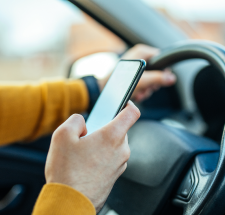 With everything your drivers do, there are plenty of opportunities for distraction. Discussion regarding distracted driving often centers around cell phones and texting, but distracted driving also includes other activities such as eating, talking to other passengers, or adjusting the radio or climate controls. This risky behavior poses a danger to everyone on the road.
With everything your drivers do, there are plenty of opportunities for distraction. Discussion regarding distracted driving often centers around cell phones and texting, but distracted driving also includes other activities such as eating, talking to other passengers, or adjusting the radio or climate controls. This risky behavior poses a danger to everyone on the road.
- In 2021, eight percent of fatal crashes, 14 percent of injury crashes, and 13 percent of all police-reported motor vehicle traffic crashes were reported as distraction affected crashes.
- In 2021 there were 3,522 people killed and an estimated additional 362,415 people injured in motor vehicle traffic crashes involving distracted drivers.
- Five percent of all drivers involved in fatal traffic crashes in 2021 were reported as distracted at the time of the crashes.
- In 2021 there were 644 nonoccupants killed in distraction-affected traffic crashes.
- The estimated economic cost of all motor vehicle traffic crashes in the United States in 2019 was $340 billion; $98 billion resulted from distracted-driving crashes.
Keep your drivers safe by establishing a distracted driving policy and sharing the following tips.
- Do not read or write while driving. Complete driver paperwork while the vehicle is stopped and parked in a safe area.
- Do not try to type, text or read messages on a computer or satellite communication system while driving. Pull off the road at a safe and legal parking location to perform these tasks.
- Do not engage in stressful or emotional conversations with passengers in the vehicle.
- Do not let occupants of other vehicles distract you from your focus on driving.
- Get adequate sleep before any trip. Fatigue decreases attention and reaction time.
- Avoid taking any medication that can cause drowsiness, either before the trip or while driving. Be sure to read the label carefully. Consult with your physician regarding alternate medications that do not cause drowsiness.
- Review driving directions and maps and check traffic and weather conditions before your trip.
- Clean and adjust all mirrors for best all-around visibility before starting the vehicle.
- Turn off cell phones. Pull off the road in a safe and legal place when making or receiving a call on a cell phone. Even hands-free devices have proven to be a driving distraction that cause collisions.
- Become familiar with the location and use of in-cab controls before you start driving.
- Postpone eating and drinking until the vehicle is safely stopped. Many collisions have occurred by just “getting a sandwich out of the cooler” while driving.
- Avoid being distracted by billboards or other forms of non-driving related signs.
- Be observant of pedestrians, but do not let them be a distraction to your driving.
- Always keep your emotions under control when in stressful driving situations.
- Look for these same distractions in other drivers and give them plenty of room. Drive defensively.
Categorized in:
ClickToAddCategories
No categories have been created yet.
Community
Company Updates
Driver Recruitment
Investor News
Transportation Safety
Claims
Driver Management
Driving Techniques
Distracted Driving
Seasonal Driving Tips
Sharing the Road
Health & Wellness
Injury Prevention
Regulations
Security & Cargo Theft
Vehicle Inspections
Weather Conditions
Workplace Safety
Workers Compensation
Done